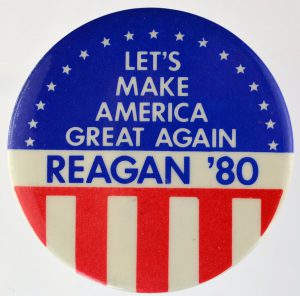
“Make America Great Again.” Again. Despite what the media coverage lead us to fear, the world did not end with the election of Donald Trump as the 45th President of the United States. No candidate in the 2016 presidential campaign was as omnipresent in the public perception as Trump. It has been said that the speech Trump gave on January 20 did not foreshadow a good presidency; it was aggressive, simple, and populist. But is that really something new?
36 years ago there was another polarizing candidate, first laughed at until he shot to the top of the polls: Ronald Reagan. Few people then thought he could ever become President. Nowadays, however, he is considered an icon among Republicans, and many people across party lines rank him as one of the greatest presidents in the history of the United States. Both men are divided by significant differences, such as personality, humor, or haircut. On the other hand, the two oldest presidents so far share some profound similarities, many visible when taking a closer look at two significant media moments: Reagan’s 1981 and Trump’s 2017 inaugural addresses.
Trump had not only run on basically the same campaign slogan as Reagan did – “Let’s Make America Great Again” was introduced during his 1980 presidential campaign – but also the topics both men covered in their speeches in Washington, D.C. were similar and showed that some issues have not changed over the past 30 years:
After the sworn-in presidents followed the traditions of thanking their predecessors for a smooth transition of power, the two Washington outsiders demonstrated their low opinion of the Washington elites. Reagan famously stated that In this present crisis, government is not the solution to our problem; government is the problem. We’ve been tempted to believe that society has become too complex to be managed by self-rule, that government by an elite group is superior to government for, by, and of the people. Trump’s speech echoed the same concern: Today’s ceremony, however, has a very special meaning because, today, we are not merely transferring power from one administration to another or from one party to another, but we are transferring power from Washington, D.C., and giving it back to you, the people.
Both men emphasized the importance of “the people” as a whole and inclusiveness as a goal, and both saw themselves as the messengers for those whose voices had been ignored in the past: As Reagan stated: We hear much of special interest groups. Well, our concern must be for a special interest group that has been too long neglected. It knows no sectional boundaries or ethnic and racial divisions, and it crosses political party lines. They are, in short, “We the people,” this breed called Americans. Trump’s words in 2017 are almost identical: What truly matters is not which party controls our government, but whether our government is controlled by the people. The forgotten men and women of our country will be forgotten no longer. Everyone is listening to you now. You came by the tens of millions to become part of an historic movement, the likes of which the world has never seen before. At the center of this movement is a crucial conviction that a nation exists to serve its citizens. We are one nation and their pain is our pain. Their dreams are our dreams and their success will be our success. We share one heart, one home and one glorious destiny.
The two presidents also addressed perceived foreign foes, using an almost aggressive language. Here’s what Reagan had to say: To those neighbors and allies who share our freedom, we will strengthen our historic ties and assure them of our support and firm commitment. We will match loyalty with loyalty. As for the enemies of freedom, those who are potential adversaries, they will be reminded that peace is the highest aspiration of the American people. We will negotiate for it, sacrifice for it; we will not surrender for it, now or ever. Stressing the importance of a strong commander in chief, Trump also used the same rough language: We will seek friendship and goodwill with the nations of the world. We do not seek to impose our way of life on anyone, but rather to let it shine as an example for everyone to follow. We will reinforce old alliances and form new ones — and unite the civilized world against radical Islamic terrorism, which we will eradicate completely from the face of the Earth.
Of course, differences also exist between Ronald and Donald, which are indeed striking: Reagan was called “The Great Communicator,” possibly due to his famous call across the Berlin Wall to the leader of the Soviet Union, Mikhail Gorbachev: “Mr. Gorbachev, tear down this wall.” Based on his campaign rhetoric, it is very unlikely that “The Donald” @realdonaldtrump will ever be given a nickname such as this. However, in his inaugural speech, the angry Trump every now and then faded and turned into a calmer, more appeasing human being: So, to all Americans in every city near and far, small and large, from mountain to mountain, from ocean to ocean, hear these words: You will never be ignored again. Your voice, your hopes and your dreams will define our American destiny. And your courage and goodness and love will forever guide us along the way.
If, against all odds, the new American President works on his modesty, adapts some of Ronald Reagan’s best character traits, and keeps “the people” in mind and not his own ego – who knows, maybe the world won’t come to an end after all.
Watch the speeches here:
Reagan’s Inaugural Address:
https://www.youtube.com/watch?v=hpPt7xGx4Xo
Trump’s Inaugural Address:
https://www.youtube.com/watch?v=a‑mfhjaPvsM
18,975 Total Views, 2 Views Today






